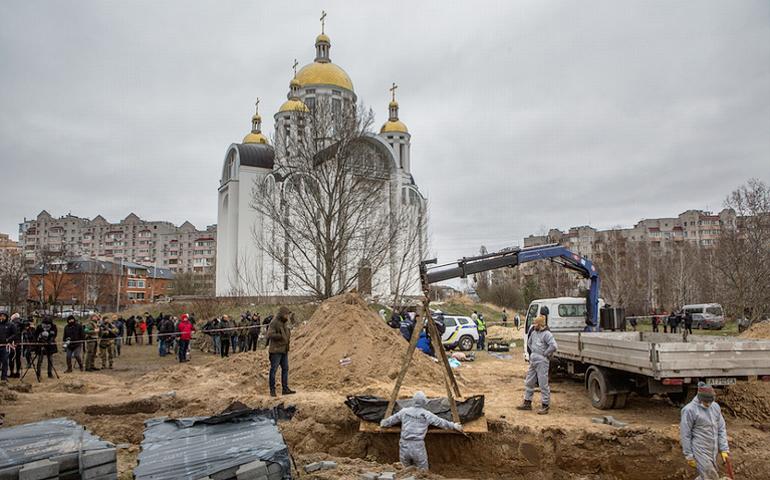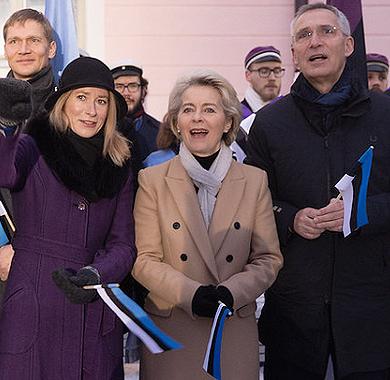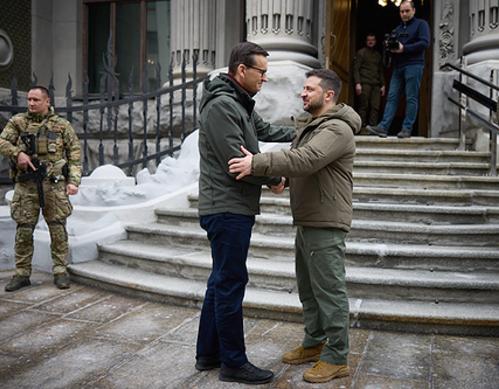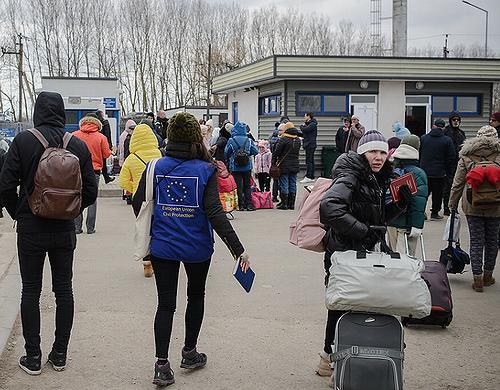Eurobarometer: EU Citizens Warmly Support Ukraine, Green Energy

By Sunny Lewis for Maximpact
BRUSSELS, Belgium, February 27, 2023 (Maximpact.com Sustainability News) – The latest Standard Eurobarometer survey published one year after Russia’s invasion of Ukraine, shows shows strong and continuing solidarity of Europeans with Ukraine and for the actions undertaken by the European Union to support the country and its people.
EU citizens also overwhelmingly support accelerating the energy transition, investments in renewable energy, and taking action to reduce the EU’s dependence on Russian energy sources.
While inflation is still a major concern for Europeans, support for the euro remains high, and respondents expressed optimism about the future of the European Union.
The Winter 2022-2023 – Standard Eurobarometer survey <https://www.avgi.gr/sites/default/files/2023-02/eurobarometer.pdf> was conducted through face-to-face and online interviews between January 12 and February 6, 2023. A total of 26,468 EU citizens were interviewed across the 27 Member States.
EU Citizens Respond to Russia’s Invasion
EU citizens continue to show their solidarity with Ukraine. The survey shows that 91 percent of respondents agree with humanitarian support for Ukraine and 88 percent are in favour of welcoming people fleeing the war into the EU.
In total, more than eight million Ukrainian refugees were registered across the European Union as of February 14, 2023. Most of them fled Ukraine by crossing its border with Poland, and Poland counts some 1.6 million Ukrainians who have remained in the country.
As of January 31, 2023, more than one million refugees from Ukraine were recorded in Germany, which has the highest monthly financial allowance for Ukrainians who fled the war compared to other EU countries.
Providing financial support to Ukraine is approved by 77 percent of those surveyed, while imposing economic sanctions on the Russian government, companies and individuals gained the support of 74 percent of the interviewees.

On February 22, too late for this Eurobarometer survey, EU President Ursula von der Leyen of Germany announced the Commission’s decision to renew the suspension of duties and trade defence measures for Ukraine for another year “as a signal of our continued political and economic support.”
“We stand by Ukraine in these dire times,” von der Leyen said, acknowledging that, “Russia’s unprovoked and unjustified aggression is severely affecting the Ukrainian economy.”
Executive Vice-President and Commissioner for Trade Valdis Dombrovskis, who is a former Prime Minister of Latvia (2009 to 2014), commented, “Since the start of the full-scale Russia’s war year ago, the EU has prioritised the importance of keeping Ukraine’s economy going. This is crucial both to help Ukraine win this war, and for its long-term recovery.”
“Unwavering EU support helps Ukraine to maintain its trade position with the rest of the world, while further deepening its trade relations with the EU,” Dombrovskis said.
A majority of Europeans continue to be in favour of banning Russian state-owned media from broadcasting (67 percent) and of the EU financing the purchase and supply of military equipment to Ukraine (65 percent).
Overall, a slim majority of European citizens (56 percent) remain satisfied with the European Union’s response to the Russian invasion of Ukraine.
A common defence and security policy among EU Member States won the support of 77 percent of respondents, the same proportion as last summer, while 16 percent are against.
Still, improvements are needed, respondents said. Eighty percent of those surveyed think that Member States’ purchase of military equipment should be better coordinated, while 69 percent believe that the EU needs to reinforce its capacity to produce military equipment.
EU Stands With Ukraine

On February 24, the one year anniversary of Russia’s invasion of Ukraine, President von der Leyen addressed the EU from the Estonian capital city Tallinn, declaring, “Now is the time to double down. We must keep giving Ukraine the means to defend itself.”
“One year on from the start of his brutal war, Putin has failed to achieve a single one of his strategic goals,” the European Commission President declared, referring to Russian President Vladimir Putin. “Instead of dividing the European Union, he finds us united and determined to stand by Ukraine for as long as it takes. Instead of dominating the global energy market, he has seen his main source of revenue slashed. Instead of wiping Ukraine off the map, he is confronted with a nation more vigorous than ever.”
But today, one year after the invasion began, the fight rages on, she said, while pointing out that Russia is increasingly isolated among the 193 Member States of the United Nations.
“I think the vote yesterday at the United Nations General Assembly was very telling – 141 countries voted in favour of the resolution condemning Russia,” von der Leyen said. “Russia is falling backwards towards an autarchic economy, cut away from the world. Our sanctions are eroding sharply its economic base, slashing any prospect to modernise it.”
“At the same time, we work to ensure Ukraine’s economic and military resilience. First, with continued financial support. We mobilised so far €67 billion. Second, with increased military support. We aim to train 30,000 Ukrainian soldiers in the European Union. Our Member States are delivering military equipment,” said von der Leyen, a former German defence minister, adding that the EU will ramp up production of military equipment needed by Ukrainian forces, and “to replenish our own stocks.”
“Ukraine has become a testament to the bravery of a nation which will never relent in its quest for freedom. We have seen that in every single day of the 365 days since the beginning of this atrocious war,” von der Leyen said. “And just as Estonia stands proudly as a free and independent state, Ukraine will prevail. Ukraine will prevail because Ukrainians will neither flinch nor step back. And Ukraine will prevail because Europe and its partners and allies will stand firm.”
She held out hope that when the Russians end this war and leave Ukraine, the country will join the European Union.
“Ukrainians are fighting for their right to choose their own future. And they have already chosen. They have chosen the European Union,” she declared. “They have chosen the unity of principles. … The Ukrainian soldiers fighting in the trenches of Bakhmut are defending this unity of principles. And in these dark times, the hearts of Ukrainian people are warmed by the confidence that Ukraine will join the European Union one day.”
Green Energy Transition Wins Overwhelming Support
The great majority of EU citizens (84 percent) agree that the EU should reduce its dependency on Russian sources of energy as soon as possible. They strongly agree that EU should support the green transition by investing in renewable energies (86 percent).
A total of 85 percent of Europeans surveyed are convinced that increasing the energy efficiency of buildings, transport and goods will make the EU less dependent on energy producers outside the 27 Member States.
In addition, 81 percent of respondents say that they have taken action to reduce their own energy consumption.
Last May, the European Commission presented its REPowerEU plan to help Member States achieve more energy independence from Russia. Ten months later, 75 percent of respondents evaluate the
REPowerEU plan as a good thing, compared to about one in ten (11 percent) who think it is a bad thing. One in seven respondents (14 percent) do not have an opinion about the REPowerEU plan.
In all Member States, a majority of respondents evaluate the REPowerEU plan as a good thing. The highest proportions sharing this view are observed in Romania (87 percent) and Portugal (91 percent), while the lowest are found in Slovakia (55 percent) and Czechia (58 percent).
EU Member States should jointly buy energy from other countries to get a better price is an opinion shared by a solid 82 percent.
Is the Green Transition Fair?

A separate Eurobarometer survey in October 2022 on fairness perceptions of the green transition shows that 88 percent of EU citizens support a green transition that leaves no one behind. Yet, only 46 percent of Europeans are currently confident that by 2050 sustainable energy, products and services will be affordable for everyone, including poorer people.
In relation to the green transition, the October Eurobarometer survey found that half of Europeans (50 percent) agree that the EU is doing enough to ensure that the green transition is fair, 50 percent say this also about their regional, city or local public authorities, 47 percent about their national governments but just 43 percent agree that the corporate sector is doing enough.
The percentage of Europeans surveyed who feel a personal responsibility to act to limit climate change is strong,77 percent, and just over half, 53 percent, are confident that they could use less energy than they do now. More than half (57 percent) of Europeans think that climate policies will create more new jobs than they will remove, and 61 percent think these jobs will be of good quality.
Support for the Euro Balances Economic Worries
EU citizens consider rising prices, inflation and they cost of living as one of the two most important issues facing the EU at the moment (32 percent), followed by the international situation (28 percent), and the energy supply (26 percent).
Perception of the situation of the European economy has remained unchanged since summer 2022, with 40 percent assessing it as good and 51 percent as bad. Perception of the national economy has also remained relatively stable since summer 2022, with 35 percent now judging it is good and 63 percent believing it is bad.
In this context, support for the euro remains at a very high level in the EU as a whole – 71 percent, the second highest level ever recorded – and even stronger, 79 percent, in the euro area.
In addition, more than half of the respondents (54 percent) think that the NextGenerationEU recovery plan can be effective to respond to the current economic challenges. Of those surveyed, 63 percent also believe that public money should be used to stimulate private sector investment at the EU level.
Europeans Optimistic About the EU of the Future
The Winter 2022-2023 – Standard Eurobarometer survey found that 47 percent of Europeans interviewed tend to trust the EU, and 32 percent tend to trust national governments. Forty-five percent of Europeans have a positive image of the EU, 36 percent a neutral image and 18 percent a negative image.
The country with the highest total “positive” image is Ireland (74 percent), while the lowest is Slovakia (32 percent)
A majority of respondents in 17 EU Member States trust the EU, with the highest levels observed in Denmark (71 percent), Portugal (65 percent), and Malta and Lithuania (64 percent each).
Younger respondents and those who have spent more time in full-time education tend to trust the EU more, the survey found.
Finally, 62 percent say they are optimistic about the future of the EU. That measure is down three percentage points compared to summer 2022 but it is similar to the level recorded in February 2022, before Russia’s aggression against Ukraine.